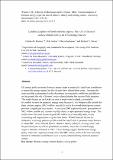Files in this item
Limited adoption of biomass energy crops : the role of farmers' socio-cultural identity in influencing practice
Item metadata
| dc.contributor.author | Warren, Charles Raymond | |
| dc.contributor.author | Burton, Robert | |
| dc.contributor.author | Buchanan, Olivia | |
| dc.contributor.author | Birnie, Richard | |
| dc.date.accessioned | 2017-10-12T23:32:13Z | |
| dc.date.available | 2017-10-12T23:32:13Z | |
| dc.date.issued | 2016-06 | |
| dc.identifier | 241882274 | |
| dc.identifier | 332736f2-161e-4170-81cd-7c508dd2990e | |
| dc.identifier | 84962798213 | |
| dc.identifier | 000377234900017 | |
| dc.identifier.citation | Warren , C R , Burton , R , Buchanan , O & Birnie , R 2016 , ' Limited adoption of biomass energy crops : the role of farmers' socio-cultural identity in influencing practice ' , Journal of Rural Studies , vol. 45 , no. C , pp. 175-183 . https://doi.org/10.1016/j.jrurstud.2016.03.017 | en |
| dc.identifier.issn | 0743-0167 | |
| dc.identifier.other | ORCID: /0000-0003-4449-4068/work/60195873 | |
| dc.identifier.uri | https://hdl.handle.net/10023/11841 | |
| dc.description.abstract | UK energy policy promotes biomass energy crops as potentially significant contributors to renewable energy targets, but few farmers have planted these crops. Amongst the many possible explanations for this disconnect between policy ambitions and delivery on the ground, the role of farmers’ socio-cultural identity has received little attention. This study focuses on the Lockerbie area in south-west Scotland, a potentially favourable location for perennial energy crops because (i) it is biophysically suitable for short rotation coppice (SRC) willow, and (ii) Britain’s first wood-fueled power station provides a significant local market. A survey in 2009 explored farmers’ perceptions of SRC willow, and the key reasons why they adopt or reject perennial energy crops. The results show that most farmers regard SRC willow as a financially risky, overly committing and inappropriate crop for their farms. Whilst financial factors are influential, even large potential profits would be insufficient to persuade many farmers to adopt SRC. Non-financial factors related to identity, lifestyle, farming culture and the perceived priority of food production powerfully shape the overwhelmingly negative attitudes of farmers to SRC. These findings suggest that biomass energy policy, especially regarding woody crops like SRC willow, needs to be more precisely tailored to influential social factors such as socio-cultural identity and local producer culture. | |
| dc.format.extent | 278006 | |
| dc.language.iso | eng | |
| dc.relation.ispartof | Journal of Rural Studies | en |
| dc.subject | Biomass energy | en |
| dc.subject | Farmer identity | en |
| dc.subject | Energy policy | en |
| dc.subject | SB Plant culture | en |
| dc.subject | GE Environmental Sciences | en |
| dc.subject | NDAS | en |
| dc.subject | SDG 2 - Zero Hunger | en |
| dc.subject | SDG 7 - Affordable and Clean Energy | en |
| dc.subject.lcc | SB | en |
| dc.subject.lcc | GE | en |
| dc.title | Limited adoption of biomass energy crops : the role of farmers' socio-cultural identity in influencing practice | en |
| dc.type | Journal article | en |
| dc.contributor.institution | University of St Andrews. Geography & Sustainable Development | en |
| dc.contributor.institution | University of St Andrews. St Andrews Sustainability Institute | en |
| dc.identifier.doi | https://doi.org/10.1016/j.jrurstud.2016.03.017 | |
| dc.description.status | Peer reviewed | en |
| dc.date.embargoedUntil | 2017-10-12 |
This item appears in the following Collection(s)
Items in the St Andrews Research Repository are protected by copyright, with all rights reserved, unless otherwise indicated.

